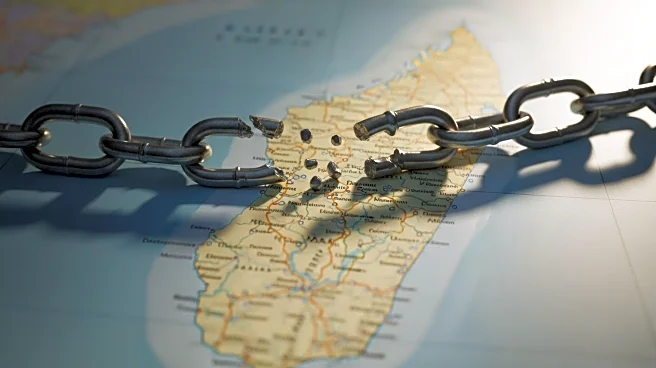What is the story about?
What's Happening?
Madagascar's President Andry Rajoelina has announced the dissolution of his government following a series of protests led by young people, known as the 'Gen Z' protests. These demonstrations erupted in response to ongoing water and power shortages affecting the nation. Despite the president's decision to sack his government, protests have continued, with demonstrators expressing dissatisfaction with the government's handling of the crisis. The protests, which began in the capital Antananarivo, have spread to eight other cities. The United Nations has criticized the security forces' response, which reportedly involved the use of unnecessary force, resulting in at least 22 deaths and over 100 injuries. The government, however, disputes these figures, claiming they are based on misinformation.
Why It's Important?
The protests in Madagascar highlight significant governance challenges and public dissatisfaction with basic service delivery, which could have broader implications for political stability in the region. The youth-led nature of the protests underscores a generational demand for accountability and effective governance. The international community, including the UN, is closely monitoring the situation, which could influence foreign relations and aid. The unrest also poses a risk to economic stability, potentially deterring investment and affecting the livelihoods of citizens reliant on consistent utility services. The government's response and ability to address these grievances will be crucial in determining the country's political future.
What's Next?
President Rajoelina has indicated plans to appoint a new government, with applications for a new prime minister being accepted over the next three days. In the interim, current ministers will continue in their roles. The president has also expressed a willingness to engage in dialogue with the youth to address their concerns. However, the continuation of protests suggests that further concessions or reforms may be necessary to quell public unrest. The international community, particularly human rights organizations, will likely continue to scrutinize the government's actions, potentially influencing future diplomatic and economic engagements with Madagascar.
Beyond the Headlines
The protests in Madagascar reflect a broader trend of youth activism and demand for change across the globe. The 'Gen Z' movement in Madagascar is part of a larger narrative of young people leveraging social media to organize and amplify their voices. This development raises questions about the role of digital platforms in modern protest movements and the challenges governments face in responding to decentralized, youth-led activism. The situation also highlights the ethical considerations of state responses to civil unrest, particularly regarding the use of force and the protection of human rights.















